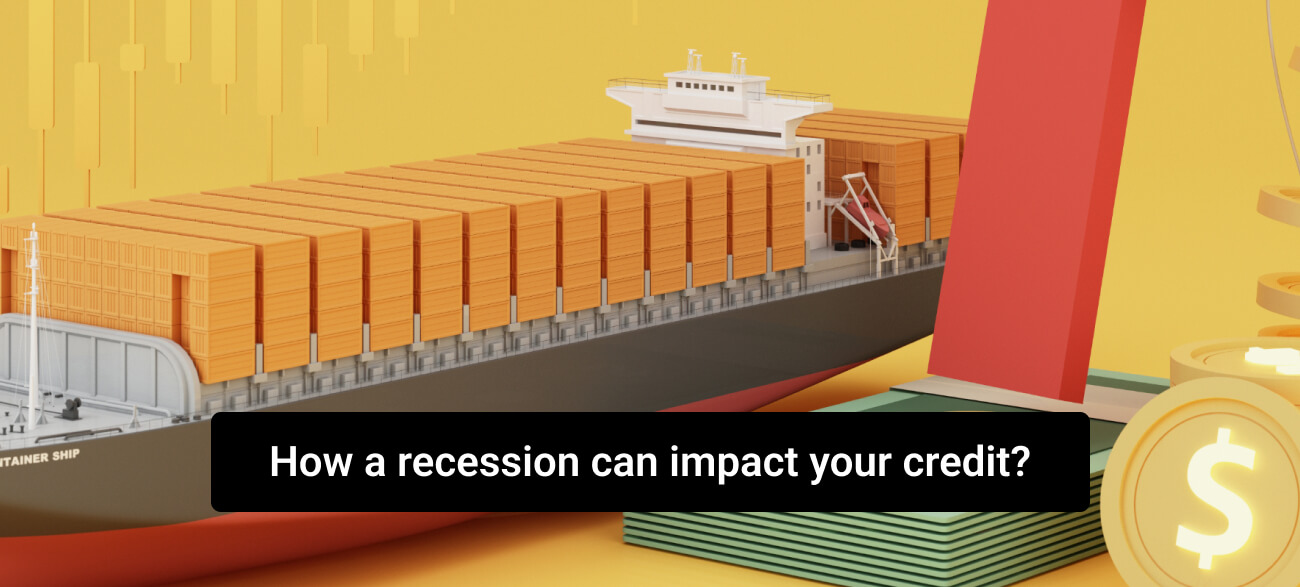Maintaining control of your debt and other expenses might be a straightforward chore when things are going well and you have a reliable source of income. However, during a recession, you might experience a different reality. Your credit scores may suffer if you have problems paying your payments as a result of a layoff or pay reduction. However, things don't have to be that way. Developing excellent credit habits, cutting costs, and ensuring you have an emergency savings account are all ways to raise your credit score during a recession.
How Can a Recession Affect Credit?
Your credit can be impacted by a recession in a variety of ways, both directly and indirectly. It could be challenging to meet your payments if you lose your work or get paid less. Your credit score will be negatively impacted if you make late payments or skip payments altogether.
You can start relying on credit cards to cover your essential needs if your income is cut. Your credit use ratio will increase as your credit card debt gradually grows. This ratio calculates the difference between the amount of available credit you now have and the amount of credit you are currently utilising. Your credit ratings may deteriorate if you start utilising more than 30% of your available credit.
During a recession, applying for too many credit cards, loans, or other forms of credit could potentially hurt your credit score. Lenders run hard inquiries on your credit reports for each application you submit. Lenders may be concerned if you make too many difficult questions in a short period.
Receiving new loans may become more difficult during recessions. It might be more challenging to get authorised for loans or credit cards during a recession since lenders frequently impose stricter criteria for granting credit. During a recession, maintaining or even raising your credit score will assist ensure you have access to credit when you need it truly.
On the plus side, certain lenders might be more accommodating to borrowers who are having trouble making payments during difficult circumstances. They might provide you with choices like decreasing or delaying payments, which can help you keep up with payments and keep your credit score high. Try not to wait until the payment due date has gone if you suspect you might have difficulties making your payments. Instead, get in touch with the creditor as soon as you can to see if they can help. Being proactive helps maintain your account in good standing and prevent a decline in your credit score.
Review your credit report and score
When a recession strikes, one of the first things you should do is check your credit score and obtain a copy of your credit report so you can understand where you stand and how much work you'll need to put in to raise it.
Examine your credit reports from each of the three major credit agencies, Equifax, TransUnion, and Experian, for any errors. Sometimes when reporting to the credit bureaus, creditors make mistakes. Your credit score may suffer if a creditor incorrectly reports to the credit agency that you made late payments or that your account was turned over to collections until you make the necessary solutions. You should register a dispute with that credit agency if you find an inaccuracy to get the data repaired.
Your credit score may be raised by erasing erroneous negative information. Regularly reviewing your credit report will help you to stay on top of any errors and report them to the credit bureau before they hurt your credit score. Additionally, Experian offers a free credit report and score every month, and you can set up free credit monitoring to be informed of any changes to your credit report or credit score.
Get Ahead of Overdue Payments
During a recession, keeping up with your payments is essential to retaining good credit. Your payment history, which accounts for 35% of your FICO® Score, is the single most significant component in determining your credit score (the most commonly used score). Your credit score might suffer from even one missed payment.
Make it a point to catch up on any payments you are behind on as soon as you can. When your accounts are up to date, make sure to keep up with your payments. Consider setting up automatic payments for the bare minimum needed if you have difficulties remembering when your payments are due and you have more than one credit account to take care of. This will guarantee that you never forget a deadline.
Think about changing your spending patterns and creating a budget.
If you don't already have one, make one right away. A good time to assess your budget and make some changes to your spending habits is right now if you already have one. Even during a recession, you may keep your finances stable by cutting back on unnecessary expenses.
Determine your income, your necessary expenditures, such as your mortgage or rent, food, and transportation, as well as how much you spend on non-essentials like eating out or shopping for new clothes before you can construct a budget. You can gain a better understanding of your spending patterns and areas where you can make savings by keeping track of your expenses for a few months.
You should try to cut back on both necessary and unnecessary expenditures as much as you can during a recession. Make sure your spending is within your income range to avoid having to use credit cards. If you must use credit cards, only charge what you can afford to pay off each month in full. A large credit card amount will lower your credit score and make it difficult to make payments, especially if you lose your job or your income is cut.
Conclusion
Yes, a recession can lower your credit score, but there are several easy steps you can take to keep or even raise your credit score during a recession. You can ensure you have the money you need to pay your bills and keep a decent credit score regardless of the economy by creating a budget, cutting back on costs, and saving money for emergencies.
Consider enrolling in Experian BoostTM, a free programme that provides you credit for on-time utility and phone bill payments, if you need to raise your credit score quickly. (Typically, this data does not appear on your credit report.) Why not use your electricity and cellular bills, which you will still have to pay even during a recession, to raise your credit score?



